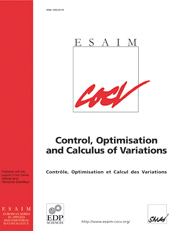Crossref Citations
This article has been cited by the following publications. This list is generated based on data provided by
Crossref.
Fernández-Cara, Enrique
and
Münch, Arnaud
2013.
Strong convergent approximations of null controls for the 1D heat equation.
SeMA Journal,
Vol. 61,
Issue. 1,
p.
49.
Fernández-Cara, Enrique
and
Münch, Arnaud
2014.
Numerical Exact Controllability of the 1D Heat Equation: Duality and Carleman Weights.
Journal of Optimization Theory and Applications,
Vol. 163,
Issue. 1,
p.
253.
Castro, Carlos
Cîndea, Nicolae
and
Münch, Arnaud
2014.
Controllability of the Linear One-dimensional Wave Equation with Inner Moving Forces.
SIAM Journal on Control and Optimization,
Vol. 52,
Issue. 6,
p.
4027.
Cîndea, Nicolae
and
Münch, Arnaud
2015.
Inverse problems for linear hyperbolic equations using mixed formulations.
Inverse Problems,
Vol. 31,
Issue. 7,
p.
075001.
Cîndea, Nicolae
and
Münch, Arnaud
2015.
A mixed formulation for the direct approximation of the control of minimal $$L^2$$ L 2 -norm for linear type wave equations.
Calcolo,
Vol. 52,
Issue. 3,
p.
245.
Cîndea, Nicolae
and
Münch, Arnaud
2016.
Simultaneous reconstruction of the solution and the source of hyperbolic equations from boundary measurements: a robust numerical approach.
Inverse Problems,
Vol. 32,
Issue. 11,
p.
115020.
Fernández-Cara, Enrique
Münch, Arnaud
and
Souza, Diego A.
2017.
On the Numerical Controllability of the Two-Dimensional Heat, Stokes and Navier–Stokes Equations.
Journal of Scientific Computing,
Vol. 70,
Issue. 2,
p.
819.
Baudouin, Lucie
de Buhan, Maya
and
Ervedoza, Sylvain
2017.
Convergent Algorithm Based on Carleman Estimates for the Recovery of a Potential in the Wave Equation.
SIAM Journal on Numerical Analysis,
Vol. 55,
Issue. 4,
p.
1578.
Micu, Sorin
Rovenţa, Ionel
and
Temereancă, Laurenţiu Emanuel
2020.
Approximation of the controls for the wave equation with a potential.
Numerische Mathematik,
Vol. 144,
Issue. 4,
p.
835.
de Carvalho, Pitágoras P.
and
Fernández-Cara, Enrique
2020.
Numerical Stackelberg--Nash Control for the Heat Equation.
SIAM Journal on Scientific Computing,
Vol. 42,
Issue. 5,
p.
A2678.
Castro, Carlos
and
Münch, Arnaud
2021.
Singular asymptotic expansion of the exact control for the perturbed wave equation.
Asymptotic Analysis,
Vol. 122,
Issue. 1-2,
p.
1.
Münch, Arnaud
and
Trélat, Emmanuel
2022.
Constructive Exact Control of Semilinear 1D Wave Equations by a Least-Squares Approach.
SIAM Journal on Control and Optimization,
Vol. 60,
Issue. 2,
p.
652.
Münch, Arnaud
2023.
Numerical Control: Part B.
Vol. 24,
Issue. ,
p.
341.
Bhandari, Kuntal
Lemoine, Jérôme
and
Münch, Arnaud
2023.
Exact boundary controllability of 1D semilinear wave equations through a constructive approach.
Mathematics of Control, Signals, and Systems,
Vol. 35,
Issue. 1,
p.
77.
Boumimez, Somia
and
Castro, Carlos
2024.
Numerical approximation of the boundary control for the wave equation in a square domain with a spectral collocation method.
Computational and Applied Mathematics,
Vol. 43,
Issue. 2,
Rovenţa, Ionel
Temereancă, Laurenţiu Emanuel
and
Tudor, Mihai-Adrian
2024.
An application of moment method to uniform boundary controllability property of a semidiscrete 1-d wave equation with a lower rate vanishing viscosity.
Journal of Differential Equations,
Vol. 389,
Issue. ,
p.
1.




